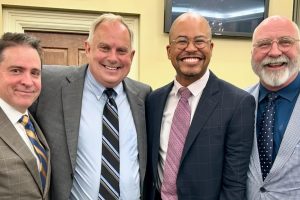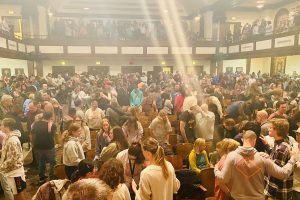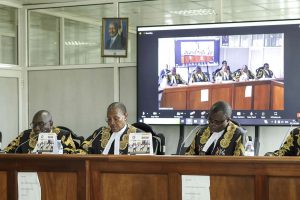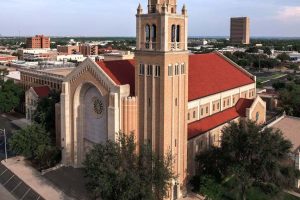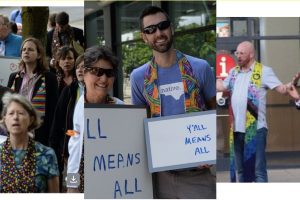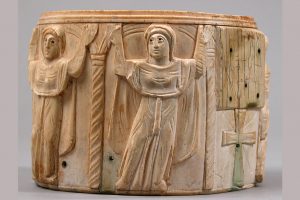By Alan Bean
Dietrich Bonhoeffer was the only prominent Christian in Germany to grasp the hideous spiritual implications of Adolf Hitler and the Nazis from the outset. Martin Niemoller’s famous ”first they came for” litany sketched out a typical pattern in Third Reich Germany:
First they came for the Socialists, and I did not speak out —
Because I was not a Socialist.
Then they came for the Trade Unionists, and I did not speak out —
Because I was not a Trade Unionist.
Then they came for the Jews, and I did not speak out —
Because I was not a Jew.
Then they came for me — and there was no one left to speak for me.
Bonhoeffer realized from the beginning that Jesus stood on the side of the socialists, the trade unionists, the Jews, the Roma, the homosexuals, the intellectually challenged and every other substratum of society targeted by the Nazis. Karl Barth, the primary author of the famed Barmen Declaration, took a bold stand against the Nazis, and he was not alone. But as Niemoller’s mea culpa suggests, “the Confessing Church” was primarily concerned with the Nazis’ re-writing of Christian theology; the plight of Hitler’s non-Christian victims was strictly secondary.
Reggie Williams, assistant professor of Christian ethics at McCormick Theological Seminary, argues in his recent book, Bonhoeffer’s Black Jesus, that Dietrich Bonhoeffer understood the Nazi soul because he viewed German reality through the lens of American black theology as mediated through the preaching of Adam Clayton Powell Sr., pastor of Harlem’s Abyssinian Baptist Church.
This is not a book about Bonhoeffer’s theology, per se. Too much theology betrays the assumption that human thought is abstracted from the rough and tumble of experience. Blessedly, Williams doesn’t make that mistake.
Williams started ruminating on the black roots of Bonhoeffer’s Christianity during a course taught by Dr. J. Alfred Smith, senior pastor of Allen Temple Baptist Church in Oakland, Calif. “African-American spirituality is a spirituality that was born and shaped in the heat of oppression and suffering,” Smith told his students. “Blackness is a metaphor for suffering. To know blackness is to be connected to the suffering, hope and purpose of black people.”
Bonhoeffer came “to know blackness” as a Sloane Fellow at Union Theological Seminary in New York during the 1930-1931 academic year. Williams argues, persuasively, that the gifted theological wunderkind held a typically German worldview when he arrived at Union.
Germany had been humiliated by the Treaty of Versailles that held the German people responsible for the carnage of the First World War. Germany entered the great worldwide depression of 1929 already staggering under the crippling economic reparations imposed at Versailles.
Moreover, the victors in the First World War deprived Germany of her colonial possessions. Coming of age during this painful period, Bonhoeffer’s early theology stressed the necessity of solidarity with the German Volk, a people which, for all its misfortune, represented the pinnacle of human evolution. Religion was blended with everyday life, and the primary business of everyday life was about restoring German national pride.
The predominant expression of Christianity in postwar Germany was a malaise of Lutheranism, social Darwinism, and nationalism fused in a triumphalist view of history described as God’s order of creation. … The concept of orders became theological support for the Nazi language of blood and soil, or racial superiority, and a pure Volk.
Taking his cue from Willie Jennings, Williams characterizes the European theological academy as the product of “a diseased social imagination.”
The infection occurred when theology was merged with the colonial system to provide religious authority for centering the world on a European imagination, making Christ a white European man, and to offer an apologetics for domination and authoritarianism.
What W.E.B. Du Bois calls “the color line” was a direct result of the European allegiance to a white Christ. Williams argues that:
The project of theology in colonialism was split in this [European] assembly; it was primarily doctrinal and conceptual, lacking content for Christian conduct. That split was necessary to justify the domination of foreign bodies that accompanied classifying human beings by race, securing the advantages of whiteness, and accommodating the practices of colonialism.
Nazi ideology, in other words, was an egregious expression of the imperialistic, Eurocentric theology dominating the white world. “The white Christ was the theological muscle of the power structure of the the color line and its global manifestations,” Williams says. “Colonization, imperialism, nationalism, and white terrorism in America” were all part of the mix.
The book is titled Bonhoeffer’s Black Jesus because, Williams believes, the white Jesus of European theology failed to grasp the spiritual significance of racism, imperialism or, most significantly, the Nazi challenge to Christianity.
Only the black Church, Williams asserts, could bear witness to a black Jesus. Bonhoeffer, as any student of his life knows, was distressed by the brand of spirituality on offer at Union Seminary and the white churches he encountered while in America. Immersed in what many consider the high-water mark of American liberal religion Bonhoeffer was underwhelmed.
In New York, they preach about virtually everything; only one thing is not addressed, or is addressed so rarely that I have as yet been unable to hear it, namely, the gospel of Jesus Christ. … So what stands in place of the Christian message? An ethical and social idealism borne by a faith in progress that — who knows how? — claims the right to call itself “Christian.”
Conservative Christians have used comments of this sort to claim Bonhoeffer as one of their own; but Williams calls this a mistake. There was nothing more typically “conservative” in America than the Jim Crow Christianity that flourished in the South. Bonhoeffer’s Black Jesus argues that Bonhoeffer understood Nazi religion by viewing it through the lens of the American color line and his travels in the American South were particularly instructive in this regard. The German theologian didn’t take his cue from white American Christians, liberal or conservative.
Williams isn’t suggesting that all black churches were equally adept at discerning and proclaiming the black Jesus, but (following J. Alfred Smith) he does argue that the distinctive suffering of black America, poignantly reflected in what were then called “Negro spirituals,” implied a critique of Europe’s White Jesus.
The white theological imagination of the period was captured by the tension between fundamentalist and liberal versions of Christianity. Eight years before Bonhoeffer arrived in America, Harry Emerson Fosdick had preached “Shall the Fundamentalists Win,” a sermon that, through the ministrations of John D. Rockefeller Jr., would eventually make Fosdick the founding pastor of Manhattan’s Riverside Church located just down the street from Union Seminary. Black Christian concern transcended this liberal-conservative tension because it had more immediate concerns.
Most liberal whites failed to see white supremacy as a matter for Christian attention, and as a consequence they ignored the constant dangers of daily life in America for black people. But avoiding racism was not a choice for African American Christians; it was a matter of life or death in a society organized by race and enforced by violence.
Bonhoeffer’s guide to the world of black Harlem Christianity was Albert Fisher, the son of Charles Fisher, pastor of Birmingham’s 16th Street Baptist Church and, like Bonhoeffer, a Sloan Fellow at Union. The young German could amble down the street to Fosdick’s splendid Riverside Church on his own initiative; but he needed the friendship of Albert Fisher to cross the color line.
Williams isn’t suggesting that Bonhoeffer’s brief time of study in America was the only significant influence on his later thinking. Matthew Kirkpatrick has recently argued that the “religionless Christianity” Bonhoeffer developed in a Nazi prison was inspired by Soren Kierkegaard’s radical critique of Christendom and I doubt Williams would disagree. The argument is that Bonhoeffer’s encounter with the black Jesus in Harlem allowed him to empathize with the suffering of marginalized people so deeply that, on his return to Germany, the devilish spirit of Hitler’s National Socialism was readily apparent.
The full title of Williams’s 140-page book is Bonhoeffer’s Black Jesus: Harlem Renaissance Theology and an Ethic of Resistance. The author takes us on a whirlwind tour of mid-1930s black Harlem, introducing us to the work of W.E.B Du Bois, Alain Locke, Claude McKay, Georgia Douglas Johnson, Langston Hughes and Countee Cullen.
As these often discordant voices debated, argued, sermonized, anathematized and baptized, a unique perspective emerged that transcended the confines of white American theology. Some in Harlem argued that Christianity was too indelibly associated with white supremacy to be of use to African Americans.
But there was another option. Maybe the white Christians who introduced black Africans to the Christ didn’t know their Savior very well. Maybe the horror of the black experience in America could shed light on this man of sorrows. Often, the poems and essays emerging from the Harlem Renaissance find room for all sides of this debate.
Countee Cullen’s The Black Christ explains
How Calvary in Palestine,
Extending down to me and mine,
Was but the first leaf in a line,
Of trees on which a Man should swing
World without end, in suffering.
Bonhoeffer referenced The Black Christ in his writing and followed the leading figures in the Harlem Renaissance in the pages of the NAACP’s Crisis and the National Urban League’s Opportunity. Reinhold Niebuhr, one of Bonhoeffer’s professors at Union, sometimes alluded to black writers in his lectures. In a letter to Niebuhr in 1933, Bonhoeffer alluded to a (now lost) essay on “Negro literature” he had written during his year in America.
“The practice of joining in with African Americans in Harlem,” Williams says, “gave Bonhoeffer the ability to see more clearly the distinction between a damaging theology of glory, represented by a white Christ who refuses incarnation and empathy, and the healthier theology of the cross that reveals the presence of God hidden in suffering.”
Williams suggests that Bonhoeffer learned as much from the disdainful young voices who rejected the white Jesus as a hopeless cause as he learned from those, like Georgia Douglas Johnson, who embraced a black Jesus.
Come brothers, lift on high your voice,
The Christ is born, let us rejoice!
And for all mankind let us pray,
Forgetting wrongs upon this day.
He was despised, and so are we,
Like Him we go to Calvary;
He leads us by his bleeding hand,
Through ways we do not understand.
Come brothers, lift on high your voice,
The Christ is born, let us rejoice!
Shall we not to the whole world say —
God bless you! It is Christmas day!
Bonhoeffer’s association with Abyssinian Baptist Church allowed him to move beyond the literary expressions of black America to the lived experience of an exceptional congregation living through hard times. Bonhoeffer’s letters reveal the depth of his involvement at Abyssinian:
Every Sunday at 2:30 in the afternoon and together with my friend [Albert Fisher], and often as his substitute, [I] had a group of young Negroes in the Sunday school; I conducted Bible study for some Negro women and once a week helped out in a weekday church school. Hence not only did I become well acquainted with several young Negroes; I also visited their homes several times. This personal acquaintance with Negroes was one of the most important and gratifying events of my stay in America.
Abyssinian was a foreign world to the aristocratic German, but that was a large part of its charm. Bonhoeffer had found a new way to look at the world. Williams calls the Harlem Renaissance a “communal transformation of consciousness.” Many of the new ideas and experimental theologies were new to Adam Clayton Powell Sr. too, and Bonhoeffer’s pastor was hammering out the contours of a new theology on the fly on Sunday mornings.
Powell had been heavily influenced by the social gospel movement with its emphasis on creative engagement with human suffering, institutional injustice and solidarity with the poor. But social gospel icons like Washington Gladden, Josiah Strong, Theodore Munger and Walter Rauschenbusch were too captive to an optimistic Darwinian model of cultural evolution to pay much attention to the losers in America’s racial competition. Human society was evolving in a glorious direction, the thinking went, and the white race stood at the forefront of the revolution. Men like Josiah Strong chastised the “white race” for its callous exploitation of “the lesser races,” but white supremacy was simply assumed.
Powell inherited the basic structure of his theology from white social gospel theologians, but in the hands of white thinkers that tradition was stunted by the optimistic racial chauvinism Williams dissects in the early pages of this book. Powell understood that he was pushing social gospel logic into virgin territory:
The Negro church is the only church that has persistently opposed lynching and the Negro pulpit is the only pulpit that has unceasingly preached the brotherhood of man.
The Harlem Renaissance unfolded during the worst economic depression in American history and a “Great Migration” that drew hundreds of thousands of African Americans from the severe racial oppression of the American South to northern cities like Chicago, Detroit, Cleveland and, of course, Harlem.
The Great Migration brought blacks to Harlem, hopeful and dreaming of a promised land, to meet disappointment and despair. In their despair, they collectively turned to the black church as their help and familiar center of community.
Powell was creating “a black experience of the church that is empowered by a black interpretation of Christ in the context of African American survival.” Powell admitted the reality of “opiate Christianity” but located the root of the problem in what Williams calls “the compartmentalizing of Christianity rather than Christianity encompassing all of life.”
The social turmoil surrounding Abyssinian Baptist Church left Powell unsatisfied with the breezy tenets of optimistic white liberalism. “Man needs to be done over,” he said, “but he cannot be done over until he is undone.” Intellectual ascent to theological propositions meant nothing, Powell taught, if what we believe is disconnected from a suffering world. The desperately poor migrants streaming into Harlem at the height of the Great Depression called for the conversion of the Church.
It is just as much our duty to get men and women positions during this unemployment depression, as it is to get them into church. … A man hungry and cold will not have much patience with a lecture on spirituality.
It was this emphasis on lived faith, Williams believes, that shaped how Bonhoeffer “understood what the church should be doing when the church struggle began in 1933. … The tradition of Jesus the cosufferer hidden in suffering and shame that Bonhoeffer encountered within Powell’s ministry and within the Harlem Renaissance literary movement remained with him when he returned home.”
The Bonhoeffer who returned to Germany following a tumultuous year in America surprised, delighted and often bewildered sophisticated Lutherans. While in Harlem, he purchased dozens of recordings of African-American spirituals and played them incessantly to the classes and youth groups he was involved with. The typically African-American combination of academic rigor and evangelical simplicity Bonhoeffer discovered in America frequently caught his audience off guard.
One of Bonhoeffer’s Berlin students recalled the directness and “simplicity” with which Bonhoeffer “asked us whether we loved Jesus.” That different Bonhoeffer was the one who would later speak out against Nazi racism and become the celebrated author of Creation and Fall, Life Together, Discipleship, and Ethics.
If the basic thesis Williams lays out in Bonhoeffer’s Black Jesus stands up to scrutiny, American Christians must wrestle with a close spiritual parallel between the “Volkish racial purity” of the Nazis and our (usually unspoken) obsession with white supremacy. Williams throws down the gauntlet with startling force (startling for white readers, that is):
The Volkish devotion to pure German blood, with its ethnic, nationalist, imperialist longings, was the German equivalent of normalized humanity from the American version of white supremacy. … Seeing society from the hidden perspective of Harlem helped Bonhoeffer to recognize white supremacy in Germany and to see it as a Christian problem that might demand Christian political action. … Because he was exposed to American racism from the perspective of Christians who were subjected to it, Bonhoeffer was equipped with prophetic insight that his white German colleagues in the church and the academy did not have.
And that, in a nutshell, is why Bonhoeffer was able to empathize with the Jews, the trade unionists, the Roma and the rest of Hitler’s victims: he had seen this move before.
Could Bonhoeffer have entered the soulful suffering of Abyssinian Baptist Church and the Harlem Renaissance if he had come to New York from Birmingham instead of Bonn? Probably not. And that’s why Williams’s book should shake us up. If he is right (and he is) white American Christians (and the white American Church) in all its theological and ideological manifestations has missed something critical. We can’t capture the powerful simplicity of Jesus unless we repent our addiction to white supremacy in sackcloth and ashes.
Is such a thing possible? On a massive scale, likely not. But little by little, here and there, now and then, the black Jesus is insinuating his way into our white souls. And if that is true, there is hope.
Image: Dietrich Bonhoeffer working with disadvantaged German youth after his return from America.













